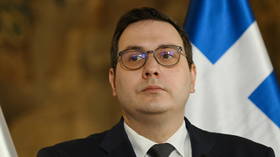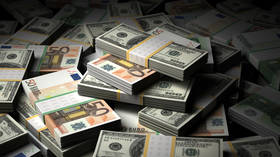EU approves sending Russian money to Ukraine – Czech FM

The EU has agreed to use the proceeds from Russian assets that the bloc has frozen to aid Ukraine, Czech Foreign Minister Jan Lipavsky has said. The annual revenue from these funds is expected to be around $3 billion.
After the start of Moscow’s military campaign against Kiev in February 2022, Western states blocked around $300 billion in Russian state assets, the bulk of which is concentrated in EU countries. Moscow has denounced this latest move as “theft” and has warned of retaliation if the funds are seized or used in any way to help Ukraine.
Western officials have floated various ideas for using the funds, ranging from outright seizure to using them as collateral to secure loans for Kiev. Another idea was to use profits from Russian assets to support Ukraine’s procurement of weapons.
Writing on on X (formerly Twitter) on Tuesday, Lipavsky said that 90% of the proceeds from the frozen Russian funds “will go to military support” of Ukraine, in line with a proposal by EU’s top diplomat Josep Borrell in March. He added that “for this year alone, it can be up to 74 billion Czech crowns ($3.5 billion).”
According to the Czech Permanent Representation to the EU, the annual revenue is expected to be around €2.5 to €3 billion ($2.7 to $3.26 billion). It noted that the remaining 10% of the interest income will go to Ukraine’s reconstruction.
Under the EU’s plan, Ukraine will receive the net profits accruing from February 15 onwards, according to Bloomberg. The money gained before this date will be retained by the Belgium-based depository and clearing house Euroclear to mitigate any risks associated with a possibility of legal action in Russia.
The decision came after several EU members, including Germany and France, resisted pressure from the US and UK to outright confiscate the Russian assets, citing concerns that such a drastic move would have no legal basis.
However, according to Bloomberg’s sources, they were more positively predisposed towards the idea of using the profits generated by the frozen Russian assets. The agency previously reported that Germany was ready to back the US plan on the matter, which would involve offering Kiev a loan of up to $50 billion based on those funds.
Kremlin spokesman Dmitry Peskov has warned the West of dire ramifications if it taps into Moscow’s assets. Such a move will create “a dangerous precedent” that “will be a solid nail in the future coffin of the entire Western economic coordinate system,” he said in April, noting that foreign investors would think twice before putting their money in countries that confiscate Russian funds.













